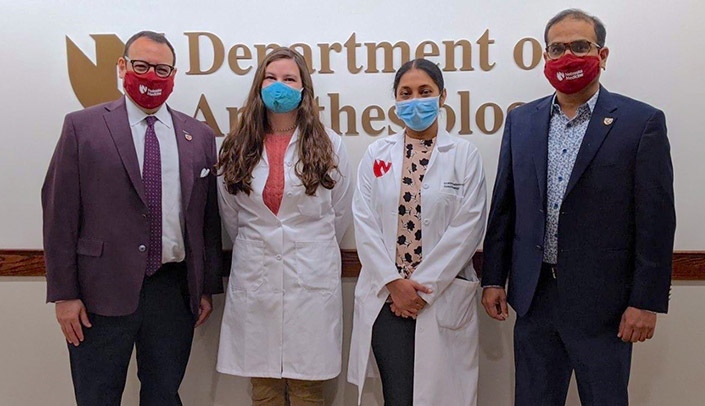Researchers at UNMC have found significant detrimental generational impacts of the prescription opioid oxycodone on offspring exposed during and after pregnancy.
The findings were published online in the journal Translational Psychiatry and were led by Katherine Odegaard, a graduate student in the lab of Sowmya Yelamanchili, PhD an assistant professor in the UNMC Department of Anesthesiology and a co-corresponding author on the study.
“Prescription opioid abuse during and after pregnancy is a rising public health concern,” said Guru Pendyala, PhD, lead author and associate professor, synaptic biology laboratory in the UNMC Department of Anesthesiology.
Using a rodent (rat) model, Dr. Pendyala said his team was able to pinpoint neurodevelopmental disruption that has lasting impacts on behavior and weight.
When exposed to the opioid the researchers found a differential expression of several neuropeptides associated with the hypocretin system. Hypocretin, also known as orexin, is a neuropeptide hormone associated with sleep, arousal, appetite and energy and produced in the hypothalamus region of the brain.
Prenatal opioid exposure induced an overproduction of the hormone resulting in the behavioral and phenotypic abnormalities.
“This is a very significant finding and could make these offspring more vulnerable to reward-seeking behaviors akin to addiction, as well as obesity,” Dr. Pendyala said.
These generational impacts also were observed in a second generation of offspring that had not been exposed to opioids but were born of mothers that had been in utero, indicating that the initial impact could carry from generation to generation, Dr. Pendyala said.
“The findings are significant in that they show how far-reaching the effects can be from the first generation having been exposed in the womb and the impact on them to the next generation born that was never exposed in utero but was still affected,” he said.
Dr. Pendyala said the clinical importance of the research led him to collaborate with Steven Lisco, MD, chair of the UNMC Department of Anesthesiology, and Sowmya Yelamanchili, PhD, assistant professor in the UNMC Department of Anesthesiology.
“The data takes us one step closer to understanding the genetics behind drug use especially transgenerational risk of addiction to prescription opioids. These provocative findings open a new line of investigation with a lot of clinical relevance,” Dr. Lisco said.
“Our immediate goal now is to reduce the expression of hypocretin using antagonists and see if they quell the behavior and weight changes observed early during development and subsequent vulnerability to drug use during adulthood,” Dr. Yelamanchili said.

Way to go, Katie!!